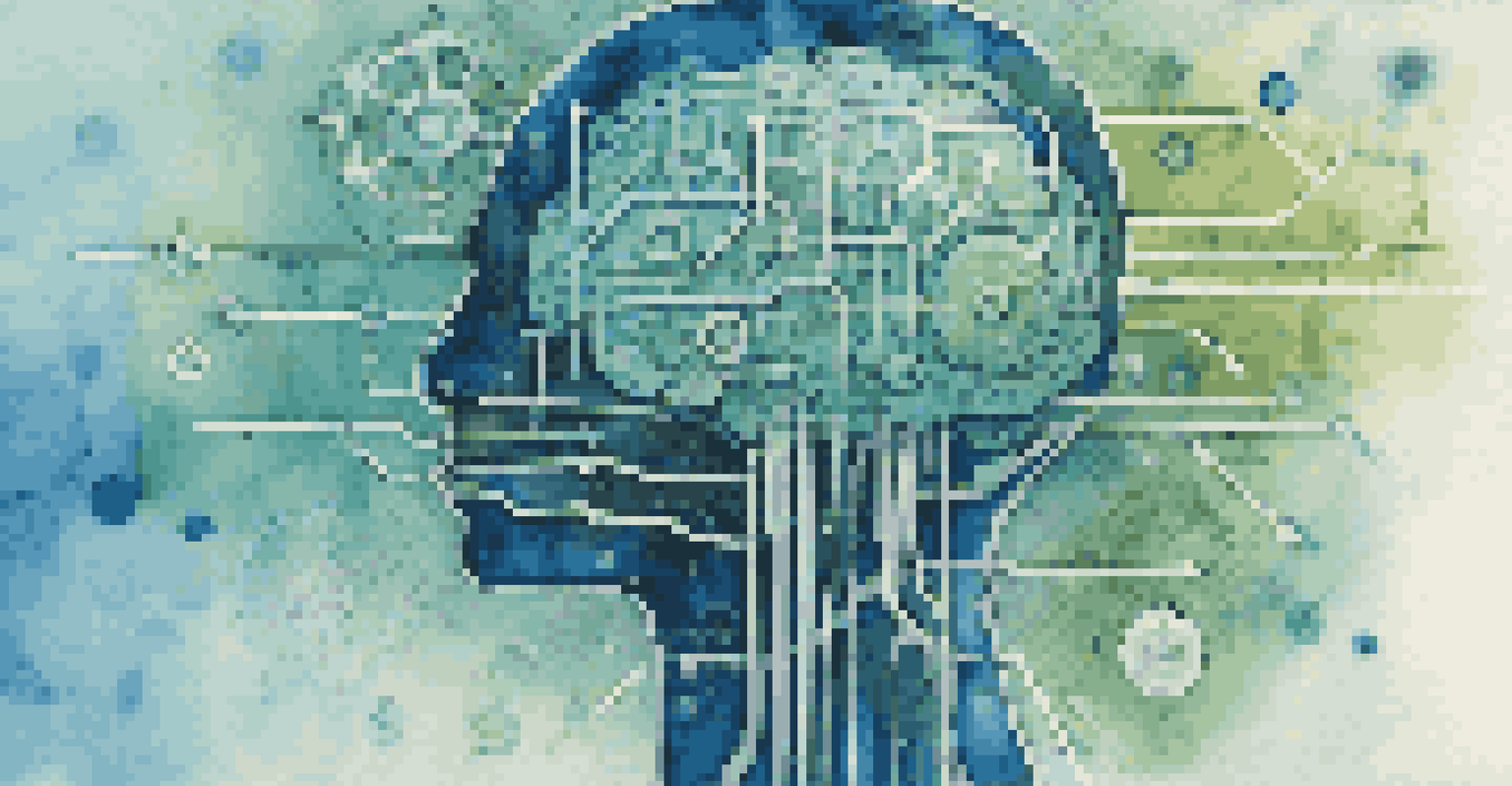The Future of Career Assessment Tools: Trends Ahead

The Shift Towards Personalized Career Assessments
As we move into the future, personalized career assessments are becoming increasingly popular. These tools analyze individual skills, interests, and personality traits, providing tailored recommendations. Much like a tailored suit, a personalized approach ensures that career guidance fits the unique profile of each user, enhancing satisfaction and effectiveness.
The future belongs to those who believe in the beauty of their dreams.
This trend is driven by advancements in technology, such as AI and machine learning, which allow for the analysis of vast amounts of data. For example, platforms like LinkedIn have begun using algorithms that consider user interactions and career trajectories to suggest potential career paths. By catering to individual needs, these assessments can significantly impact career development.
Furthermore, personalized assessments not only benefit job seekers but also employers looking to find the right fit for their teams. By understanding candidates in-depth, companies can improve their hiring processes and employee retention rates. Ultimately, this trend marks a significant shift in how career assessments are approached and utilized.
Integration of Artificial Intelligence in Assessments
Artificial intelligence (AI) is revolutionizing the landscape of career assessment tools. By leveraging AI, these tools can analyze user data more effectively and provide insights that were previously unattainable. Imagine having a career coach that learns from your preferences and behaviors, offering guidance that's continuously refined over time.

AI-driven assessments can simulate real-world job scenarios, allowing candidates to demonstrate their skills in a controlled environment. For instance, platforms like Pymetrics use neuroscience-based games to evaluate candidates' cognitive and emotional traits, matching them with suitable roles. This interactive approach not only makes assessments more engaging but also yields more accurate results.
Personalized Career Assessments Rising
Personalized career assessments are gaining popularity due to their ability to analyze individual traits and provide tailored guidance.
Moreover, AI can help identify emerging job trends and skills that are in demand, enabling users to align their career paths with market needs. As companies increasingly rely on data-driven decisions, AI-powered assessment tools will play a crucial role in shaping the future workforce.
Increased Focus on Soft Skills Evaluation
In today's job market, soft skills have gained significant attention alongside technical abilities. Career assessment tools are increasingly incorporating methods to evaluate communication, teamwork, and problem-solving skills. Think of soft skills as the oil in a well-functioning machine; they ensure that everything runs smoothly.
Feedback is the breakfast of champions.
Employers are recognizing that technical skills alone aren't enough for long-term success. For example, assessments may include situational judgment tests that present candidates with real-life scenarios requiring interpersonal skills. This approach not only helps assess candidates more holistically but also prepares them for the collaborative nature of modern workplaces.
By focusing on soft skills, career assessment tools can provide valuable insights that help individuals develop vital competencies. As we continue to embrace the importance of emotional intelligence and adaptability, these assessments will become essential for career growth and success.
Remote Assessments: A New Normal
The rise of remote work has transformed the way career assessments are conducted. With many companies adopting hybrid or entirely remote models, digital assessments have become the norm. This shift allows for greater accessibility, enabling candidates from various backgrounds to participate without geographical limitations.
Online assessment platforms now offer a variety of formats, including video interviews and gamified evaluations, making the process more engaging. For example, companies like HireVue utilize AI to analyze candidates' responses and body language during video interviews. This innovative approach not only streamlines the hiring process but also enhances the candidate experience.
AI Enhances Assessment Accuracy
The integration of AI in career assessments allows for deeper analysis of user data, improving the accuracy and relevance of career guidance.
As remote assessments become standard practice, organizations must ensure that their tools are user-friendly and accessible to all. By prioritizing inclusivity and engagement, companies can attract top talent, regardless of location, ensuring they remain competitive in the evolving job market.
Data Privacy and Ethical Considerations in Assessments
As career assessment tools become more sophisticated, concerns around data privacy and ethics are gaining traction. Users must understand how their data is collected, stored, and utilized by these platforms. Think of it as inviting someone into your home; you want to know their intentions before sharing personal information.
Moreover, ethical considerations must be at the forefront of developing these tools. For instance, biases in AI algorithms can lead to unfair evaluations, which can perpetuate discrimination. Companies must prioritize transparency and fairness to build trust with users and ensure that assessments provide equitable opportunities for all candidates.
By addressing data privacy and ethical concerns, organizations can foster a positive user experience. As these issues become more prominent, the best career assessment tools will be those that prioritize the rights and well-being of their users.
Gamification: Making Assessments More Engaging
Gamification is another trend transforming career assessment tools, making them more engaging and enjoyable for users. By incorporating game-like elements, assessments can capture candidates' attention and reduce the anxiety often associated with traditional evaluations. Imagine turning a nerve-wracking test into an exciting challenge that feels like a game.
These tools often involve interactive scenarios, quizzes, and simulations that assess various skills in a dynamic way. For example, platforms like Codility provide coding challenges that allow developers to showcase their skills while enjoying the process. This shift not only boosts engagement but also yields more authentic insights into candidates' abilities.
Soft Skills Now Essential in Hiring
There is an increased focus on evaluating soft skills in career assessments, recognizing their importance alongside technical abilities for long-term success.
As gamification becomes more prevalent, candidates are likely to feel more motivated to participate in assessments. By making the process enjoyable, organizations can attract a wider range of talent and better evaluate candidates' skills in a manner that reflects real-world scenarios.
The Role of Continuous Feedback in Career Development
Continuous feedback is emerging as a critical component of career assessments, emphasizing the importance of ongoing development. Instead of viewing assessments as one-time events, organizations are increasingly adopting a mindset focused on growth and improvement. Picture a garden where regular care and attention lead to flourishing plants; similarly, continuous feedback nurtures talent.
Career assessment tools are evolving to provide real-time feedback, helping individuals identify areas for improvement and set actionable goals. For instance, platforms like BetterUp offer coaching and feedback mechanisms that support continuous learning. This approach not only enhances individual growth but also fosters a culture of collaboration and mentorship.

By prioritizing continuous feedback, organizations can create an environment where talent thrives. As assessments become integrated into everyday practices, employees will feel more supported in their career journeys, ultimately leading to greater job satisfaction and retention.